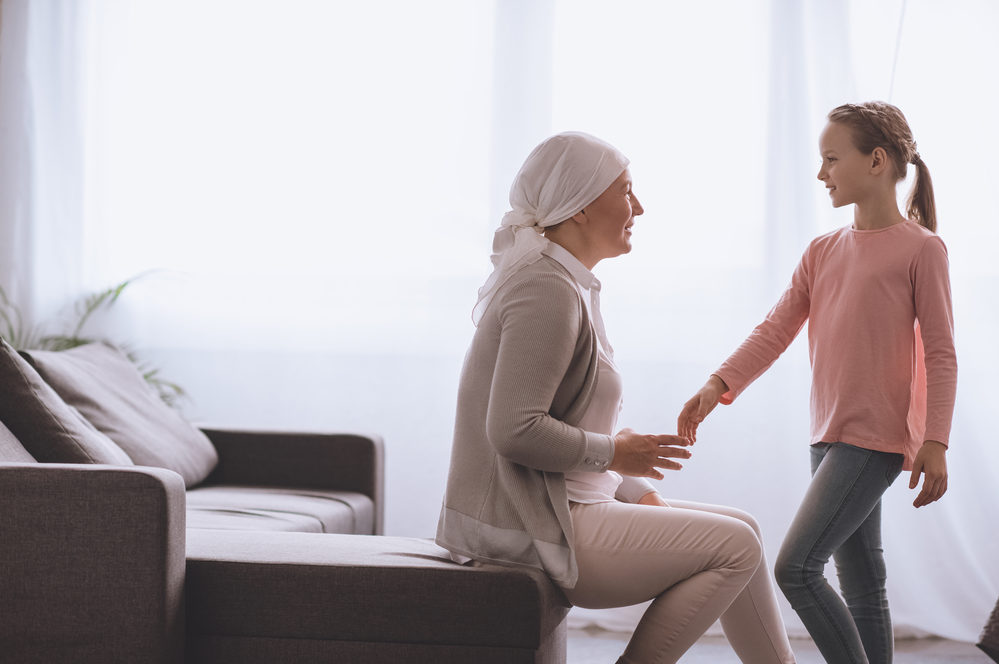Breast Cancer. The unthinkable has happened. You want to scream, cry and prey that the doctor was wrong. But before the shock, sadness and anger has even a chance to register, your mind has already gone somewhere else: what are you going to tell your children? Let’s face it, we don’t want to hurt or upset our loved ones. Breaking the news about a breast cancer diagnosis may be more difficult than actually hearing the news from your doctor. You may feel concerned about upsetting your family and friends and worried about how they will react. Even worse, you may be afraid that you won’t be able to answer their questions.
Before approaching the topic with your family, it’s important to remember that you are in control of the conversation. This means that you can decide how much information you may wish to share. The content and the tone of the conversation are entirely up to you and may be shaped depending on whether you are talking to a younger or older child or both at the same time.
Explaining Cancer to A Young Child
As the parent (or grandparent) of a young child (ages 3 to 9) you might feel that the best thing is to shield the child from the facts. Truthfully? You may be causing more harm than protecting your little person. Even very young children can sense when family members seem stressed or anxious, or when usual routines are disrupted. They will notice changes in your appearance and your energy level, and they will know that you are spending time at the hospital. In two words: THEY KNOW that something is wrong. If you were in their shoes, wouldn’t you want to know what’s going on? Wouldn’t you want the person (or persons) you trust the most to explain the changes that may occur in your life?
Although young children do not need detailed information, they do need honesty and reassurance from you as well as from their other caregivers. Without any direct explanation from you, children may imagine a situation that is actually much worse than what will really occur. Being honest with your child builds a sense of trust that will be helpful in facing not only this situation, but also other challenges that life inevitably brings.
Having the Conversation About Cancer
- Plan out the conversation in advance. Decide what you are going to say and how you are going to say it. This will give you a framework for the conversation. Involve your partner or another adult the children trust if you think their presence will be helpful.
- Use direct, simple language to define what cancer is, where it is in your body, and how it will be treated. Experts agree that naming the illness is important — “cancer” should not be a forbidden word. Even very young children can grasp simple explanations of what cells are and how they sometimes don’t “follow the rules” and grow as they should. You might also explain that the doctor has to remove all or part of your breast where the cancer is, and then use special strong medicines make sure the cancer is all gone from your body. A doll or stuffed animal could be a useful visual aid.
- Make sure children know that the cancer isn’t their fault and they cannot “catch” it. Young children may worry that the situation is their fault or that they did something to cause the cancer. Also, children tend to associate sickness with catching colds or sharing germs. Be sure to explain that no one can catch cancer from someone else.
- Tell children how treatment for cancer will affect you. Prepare them for the physical side effects of treatment, such as losing a breast, hair loss due to chemotherapy, or feeling sick or tired at times. You might explain that the medicines for cancer are powerful, and that side effects show that the medicines are hard at work inside your body. Tell children that you might feel sad, angry, or tired, but that these feelings are not their fault and are normal. Always alert them when you will need to be away from home: in the hospital or at the doctor’s office.
- Reassure children that their needs will be met. Experts agree that young children need reassurance and consistent routines in times of crisis. Let your children know that you may not always be available to take them to school and special activities, play with them, or prepare their meals. Hugging, lifting, and bathing them may be off-limits for a while, too. Tell them about the trusted friends, relatives, or other care providers who will be helping out until you feel strong again.
- Keep usual limits in place. When there is an air of uncertainty around the house, it can be tempting to let children have more treats, watch more TV, play more computer games, or buy more toys. However, maintaining the same sense of structure you always have is likely to reassure your children more than giving them special privileges or treats. Keep their usual routines as consistent as possible.
- Invite children to ask questions and learn more. Let children know that you will answer any questions they may have. If your children are old enough, you might consider bringing them to one of your doctor’s appointments or allowing a visit during treatment. This can help to take away some of the mystery surrounding cancer and its treatment.
- Let children know you will still make time for them. Carve out a special time in the day just for them. Simple activities like reading a book or watching a movie can help them know that you are still there for them, even when you’re tired or not feeling well.
- Set a positive, optimistic tone without making promises. Even if you are sad or frightened, try to project a positive tone during your conversations with young children. Children may feel overwhelmed if you seem overly anxious or emotional. Make sure they know that your doctors and nurses are doing all they can for you and that most people with breast cancer do get better. Reassure them without making definite promises about the future.
- Let teachers, school counselors, coaches, and other caregivers know what is going on. Other trusted adults who spend time with your child need to know about the diagnosis. Changes at home often cause changes in children’s behaviour in other settings. These adults can help you know how your child is doing, and they can become a source of additional care and support.
Explaining Cancer To An Older Child
Older children can be just as vulnerable and scared as smaller children but they may not show it. In fact, their reaction may be more intense because older children are likely to be more aware of the seriousness of the disease than younger children. While much of the advice for talking to young children also applies to children in middle school and high school (ages 10 to 18), older children actually have additional needs. Most importantly, be sure to talk with your older child and not at her. She needs to feel that she is part of the conversation.
- Be truthful about your diagnosis and course of treatment. Shielding children from the hard facts can harm their sense of trust in you. Even though you do not want to worry them, you need to let them know what is happening to you.
- Schedule regular family meetings or other discussion times. Older children can be involved in talks about how family activities and responsibilities might change while you are undergoing treatment. You may need to ask them to handle more household tasks than they normally do. A family meeting gives everyone a chance to have a voice in the changes that are taking place.
- Anticipate children’s questions about the future. Older children are likely to have heard that people can die of cancer. It is natural for them to be afraid that you could die and to wonder what will happen to them. Make sure your children know that most people with breast cancer do get better and live long, healthy lives. Reassure them that, no matter what happens, their needs will be met by the adults in their lives.
- Anticipate children’s questions about their own health. Your children may fear that, since you have cancer, they may get it too. This is an especially common fear among teenaged daughters of mothers with breast cancer. Even if breast cancer does not seem to run in your family, breast cancer still happens to 1 in 8 women in the United States during the course of their lifetimes. Therefore, it’s a good idea to bring up the issue at your daughter’s next doctor’s appointment. Talk to the doctor together about some steps your daughter can take now — such as eating a healthy diet, exercising regularly, and not smoking or using alcohol — to help lower the risk of developing breast cancer later in life.
- Give children permission to keep up with school and social activities. Even though older children and teens can take on more responsibility at home, they are still children. Let them know that they should continue focusing on their schoolwork, other activities, and time with friends. Children need to maintain that sense of normalcy, but they might only do so if you let them know it’s what you want.
- Realize that older children may express feelings that seem inappropriate, such as embarrassment or anger. Preteens and teens may express emotions that seem unkind or even completely out of line. They may be embarrassed by changes in your appearance, such as hair loss or weight loss and avoid going out with you or bringing friends home. They may be angry about the ways that your illness limits them and their activities. Although their reactions may upset you, remember that teens are at a time in their lives when they value appearances and their growing sense of independence. If you’re able to show acceptance of your own appearance, you can set a healthy example for your child.
- Connect them with books and other resources. Talking about cancer can be hard, even in families where communication is strong. You may want to look for books or other publications written especially for young people who have parents with cancer. Your child also may find it helpful to confide in an adult outside the immediate family, such as another relative, close friend, or even a professional counsellor. Reach out to relatives and friends and ask them if they can be available.
Great books about how to discuss cancer with your children
- What Is Cancer Anyway?: Explaining Cancer to Children of All Ages
- The Hope Tree: Kids Talk About Breast Cancer
- Our Mom Has Cancer



